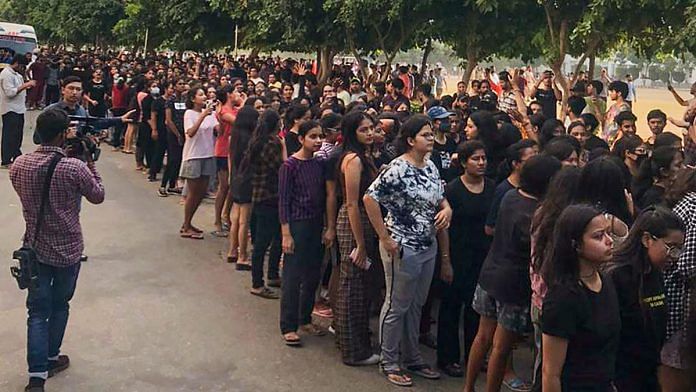The phrase ‘trial by media’, which became popular in the late 20th and early 21st centuries, refers to how television, newspaper, and social media coverage affect a person’s reputation by spreading ideas of guilt or innocence before a court of law. In recent years, there have been several cases where the media has ‘tried’ an accused and rendered a verdict before the court did.
In a recent incident at Chandigarh University, a female student was accused of making explicit videos of 60 women residents in the college and sharing them in exchange for money. Now, a footage of the student being questioned by the campus warden is being widely shared online, and it has sparked protests in the university.
A day after the massive protests, the Chandigarh Police said that no objectionable video of students was shot or sent by the accused. She had sent four videos of herself to her boyfriend, said Mohali SP Navreet Singh Virk, adding that the woman’s phone has been sent to the forensic department.
The statement of the police is ethically wrong. How can police officers lack sensitivity in this matter? You are revealing in front of the whole media that you have received the accused’s own videos, which is itself an objectionable statement. On the one hand, you are protecting the women’s privacy, and on the other, you are making open remarks about receiving the accused’s video. I want to raise some questions regarding this whole issue and the misinformation that is spread online.
Also read: ‘Mumbai se Mohali’ – How TV news covered Chandigarh University ‘MMS kand
What about the right to privacy — a fundament right under Article 21 of the Constitution? You are violating the right to privacy of the accused student.
What will be the impact of this whole issue on the mental health of the accused and her family; what if she does something wrong?
What if she gets acquitted in court; how she will live her life with such a heinous tag that social media puts on her? Who is going to ensure her security? What will be the effects of this whole incident? Our society is a patriarchal one, so who is going to stand by her? What about the right to a fair trial as the media and social media have already declared her guilty?
To sum up this whole incident, I can say that we are still living in a patriarchal world and our feminism is very selective. We have the same mindset as the hostel warden as she threatened the accused to strip her naked and put her poster outside the university, a statement that social media users proudly shared, making her a ‘hero’. The concept of justice is not ‘an eye for an eye’. India is a developing country, and our media and social media should follow some basic guidelines for reporting on sensitive issues. Police and other authorities also need some degree of sensitisation. To tackle such incidents, the role of media and social media should be regulated to put an end to disinformation. Otherwise, this will result in confirmation bias, and there will be no humanity, justice, or fair trials.
Vinay Kumar studies at Tata Institute of Social Sciences, Mumbai. Views are personal.



